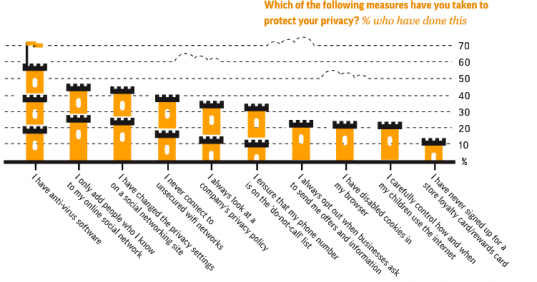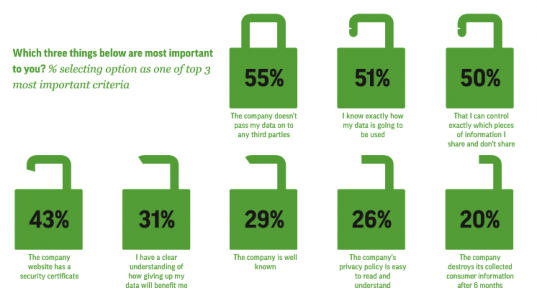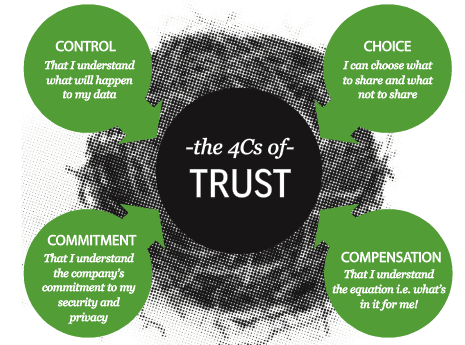Are your customers sunny sharers or walled worriers?
Value/Importance: [rating=4]
Recommended link: McCann London Facebook Page
Our customers are understandably worried about how the data they provide online is used and protected. But how worried are they really? How do their attitudes to privacy vary and how can we reassure them? This should be a concern to all marketers who collect and use data online, which must be the majority of marketers today.
I thought this was a really useful piece of global research based on a 6,525 sample in the US and five other markets with qualitative research from twelve markets.
Which are the main consumer privacy concerns?
The study has a lot of rich detail about specific consumer concerns and the actions they take. For example, this data shows that a sizeable proportion of customers prefer to closely control their online privacy.

More usefully, this data suggesting messaging that should be used on opt-in forms to control privacy.

A segmentation for consumer privacy attitudes
Looking at how attitudes vary, the study showed five different groups. There seems to be a core of around 28% who are particularly sensitive an unlikely to share their data unless essential
- Savvy Shoppers (37% of the global population, 37% of the US population). Embody the data trade-offs needed for free access to content and services. This group, is willing to engage with businesses, but wants to see safeguards such as security certificates and to receive something in return such as discounts.
- Eager Extroverts (15% of the global population, 9% of US). Defined by their love of mobility and sharing through social media. They worry that someone might denigrate them online,leading to a sour reputation among friends,partners, or employers.
- Sunny Sharers (20% of global consumers, 11% of the US. the second largest group of consumers). This optimistic group is able to see the positive outcomes associated with sharing data. They are connecting and engaging in order to get the best experience and recommendations possible. They are mindful about sharing information that could damage their finances or reputation, but they won’t let this stop them from sharing almost everything else.
- Cautious Communicators (9% globally, 7% of the US). This group is defined by their pronounced dislike of mailings, messages and other forms of frequent contact. While not particularly worried about the erosion of personal privacy, this group is the least likely to sign up for company newsletters and offers and expresses a strong desire to know exactly how their data will be used.
- Walled Worriers (19% of global consumers, 36% of US). Walled Worriers are also the most sensitive to perceived invasions of privacy. Although this group harbours a mistrust of businesses, they’re not that resistant to receiving news or offers through email. They do, however, require assurances that data collection is minimal and won’t be shared with third parties
Marketing implications of consumer privacy attitudes
It’s important to understand and comply with privacy laws affecting online marketing, but equally important to use the right messaging and have the right policies which show that you care on the consumers behalf and take this seriously.
I thought the 4Cs of privacy were a good way of summarising consumer concerns:









